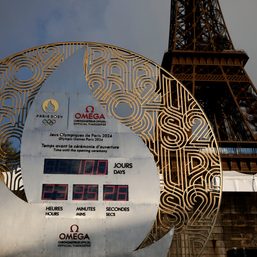SUMMARY
This is AI generated summarization, which may have errors. For context, always refer to the full article.

HARASTA, Syria – Nearly 2,000 Syrian rebels and civilians began leaving a ravaged pocket of Eastern Ghouta on Sunday, March 25, in fresh evacuations that further emptied the former rebel bastion.
Five weeks since the Syrian regime launched an all-out assault on Ghouta, it holds more than 90% of the onetime opposition stronghold on the edge of Damascus.
To help it capture the rest, key backer Russia has held talks with various rebel groups to negotiate withdrawals from the 3 remaining pockets.
One area was emptied in recent days under such a deal and evacuations began late Saturday, March 24, for a second part, held by the Islamist Faylaq al-Rahman rebel faction.
That agreement is set to see some 7,000 rebels and civilians bussed from the towns of Arbin and Zamalka and the district of Jobar to the rebel-dominated province of Idlib in northwestern Syria.
Around 980 of them quit Ghouta late Saturday, traveling overnight on buses and ambulances to northwest Syria.
Evacuations resumed on Sunday, with more than 1,800 fighters, relatives, and other civilians boarding 26 buses to leave Ghouta, state news agency SANA said.
The buses waited for several hours at the Arbin crossing, which divides Ghouta from government-controlled territory, an Agence France-Presse correspondent at the scene said.
At midday, a group of rebels could be seen descending from the vehicles to begin the Islamic noon prayer, their weapons glinting in the sunlight.
“I fled the bombs. I decided to leave to save the lives of my wife and children,” said Abu Mohammad, a 27-year-old fighter.
An Agence France-Presse correspondent saw the convoy of buses and escorting vehicles beginning to exit Ghouta and drive onto the nearby main highway on Sunday afternoon.
‘Destroyed my future’
Residents of Arbin, Zamalka, and Jobar had been bidding tearful farewells to their hometowns all morning, dragging shabby suitcases past bombed-out buildings.
Hamza Abbas, an opposition activist in Zamalka, told Agence France-Presse he was planning to board the buses too.
“People are very sad about leaving their homes, their land, their childhood memories, and the place where they spent the best days of their childhood,” he said.
“They have no money, no houses, no furniture, or even clothes to take with them because of this bombardment.”
As part of Faylaq al-Rahman’s deal with Moscow, residents had been offered the option to stay in Ghouta as it fell to the regime, but Abbas declined.
“I decided to leave Ghouta because how am I supposed to live alongside someone who killed my family, my siblings, my friends? With someone who destroyed me, my life, and my future?”
Since it began on February 18, the Ghouta assault has left more than 1,600 civilians dead, according to the Syrian Observatory for Human Rights.
Even before the onslaught, the enclave’s 400,000 residents had suffered for half a decade under a crippling regime siege that severely limited access to food, medicine, and other basic goods.
The Syrian government has used siege tactics followed by heavy bombardment and negotiated settlements to recapture swathes of territory lost to rebels.
Damascus and Moscow have applied this “leave or die” strategy to Ghouta as well, smashing the enclave into 3 isolated pockets before seeking separate evacuation deals for each.
The first Russian-brokered agreement saw hardline Islamist group Ahrar al-Sham agree to quit the town of Harasta.
More than 4,500 people, including over 1,400 fighters, left Harasta for Idlib on Thursday and Friday, March 22 and 23.
Talks are also underway for a deal over the 3rd and final pocket of Ghouta, held by Jaish al-Islam, which includes the region’s largest town, Douma.
Buses arrive in Hama
The second agreement, reached with Faylaq al-Rahman on Friday, provides for evacuations as well as medical treatment for wounded civilians and fighters and the release of rebel-held detainees.
People began leaving Faylaq-controlled territory in Ghouta late on Saturday night.
Armed, masked Russian military personnel boarded each bus as it left Ghouta on Saturday night, according to an Agence France-Presse correspondent.
They drove all night to Qalaat al-Madiq, a crossing point into rebel-held territory that is frequently used in such agreements.
Another Agence France-Presse correspondent in the town, in the central Syrian province of Hama, saw 17 buses and ambulances arrive on Sunday morning carrying the first wave of evacuees.
From there, they are expected to head towards Idlib, the last Syrian province that remains mostly under rebel control.
Tens of thousands of people bussed out of opposition territory have been brought to Idlib in recent years under “reconciliation” deals like those negotiated in Ghouta.
The population there has swelled with rebels, jihadists, and civilians.
Syria’s conflict erupted in March 2011 with anti-government protests, but has since evolved into a complex and devastating civil war. – Rappler.com
Add a comment
How does this make you feel?





There are no comments yet. Add your comment to start the conversation.